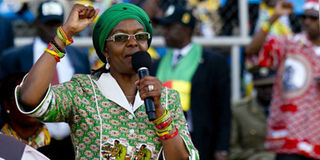No Grace Mugabe immunity, says President Mnangagwa

Former Zimbabwean First Lady Grace Mugabe raising her fist as she speaks during a rally in Harare on July 28, 2013. President Emmerson Mnangagwa says he has not granted Mrs Mugabe immunity from prosecution. PHOTO | ALEXANDER JOE| AFP
What you need to know:
Mr Mnangagwa took over from Mr Mugabe in November last year following his resignation after a military intervention.
There have been reports that Mugabe was given a $10 million retirement package but Mr Mnangagwa denied this.
On Thursday, Mr Mnangagwa said the country will go to the polls before July, in the first elections since Mugabe was ousted after 37 years in power.
Under Mugabe, who had ruled since 1980, Zimbabwean elections were marred by vote-rigging, intimidation and violent suppression of the opposition.
HARARE, Thursday
Zimbabwean President Emmerson Mnangagwa says he has not granted former First Lady Grace Mugabe immunity from prosecution.
Speaking in an interview at the ongoing World Economic Forum in Davos on Thursday, Mr Mnangagwa, however, said he had given former President Robert Mugabe a lucrative retirement package and would ensure that Mugabe’s family lives in peace, the state run Herald newspaper reported.
Mr Mnangagwa took over from Mr Mugabe in November last year following his resignation after a military intervention.
There have been reports that Mugabe was given a $10 million retirement package but Mr Mnangagwa denied this.
“There is no figure, but it is a question of him continuing to enjoy his salary, his allowances as before, offices, security and travel by first class. My government will also facilitate him going to Singapore for medical check-up,” Mr Mnangagwa said.
On Grace Mugabe’s immunity, he said: “We have not given anybody any immunity. What I promised to my former president and the founding father of our nation, President Mugabe, is that first we give him a package- a very lucrative package.”
PEACE
He further added “so we are not saying anybody commits a crime then the former status will stop the police dealing with that issue, but I am saying that the new administration will do everything possible to make sure the family lives in peace, undisturbed.”
Meanwhile, Zimbabwean civil society organizations (CSOs) have called for a roadmap that will ensure free, fair and credible elections premised on constitutionally aligned electoral laws and effective electoral administrative arrangements, among other issues.
In addition, the political environment should allow citizens to make free and informed choices on electoral processes, a statement issued by the Zimbabwe Election Support Network on behalf of civil society said on Thursday.
On Thursday, Mr Mnangagwa said the country will go to the polls before July, in the first elections since Mugabe was ousted after 37 years in power.
Under Mugabe, who had ruled since 1980, Zimbabwean elections were marred by vote-rigging, intimidation and violent suppression of the opposition.
CREDIBLE ELECTIONS
The CSOs said there were five fundamental requirements which must be completed before the country can hold credible elections.
“The first requirement is the urgent introduction of a new electoral law that is fully aligned to the constitution. This is necessary to provide a satisfactory legal framework for free and fair elections and to foster democratic values.” Previous efforts by the government to implement electoral reforms had been piecemeal, selective, inequitable and inadequate, they charged.
“In the absence of substantive legislative realignment and reform, it will be difficult for Zimbabwe to hold credible elections.”
The CSOs said there was also need for the creation and implementation of a complete, accurate, inclusive and current voters’ roll which was free from any politically motivated bias.
In the past, there have been allegations of ghost voters on the roll, including names of people who would long be dead.
SPECIAL VOTING
“A valid voters’ roll is prerequisite for the credibility of any election and is an important tool in improving the efficiency of the electoral management body. The right to vote and to contest elections should be enjoyed by all eligible citizens including women, the youth and people with disabilities as provided for in the constitution.”
They added that the Zimbabwe Electoral Commission (ZEC) should extend the right to vote to all eligible Zimbabweans including those in hospitals and prisons and reinstate special voting. Special voting was used during the 2013 elections to allow elections officers who were not based in their wards to vote, but ZEC said it would not repeat it because it did not have enough resources.
Then ZEC chairperson Rita Makarau said special voting had been troublesome from a logistical point of view as they had to track down nearly 55,000 police officers from their wards to their stations.
The SCOs also called for a truly independent electoral commission which was highly professional, adequately resourced and which adhered to regionally and internationally accepted norms of accountability, inclusivity, transparency and integrity.





